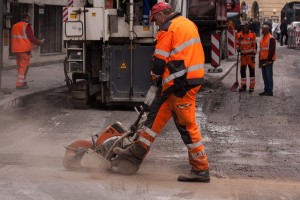nuisance, annoyance, inconvenience, harassment
[noun]
[de o-ver-last, <no plural>] ![]()
 ‘Overlast’ is used for any type of serious inconvenience, e.g. ‘verkeersoverlast’ (traffic related), ‘geluidsoverlast’ (noise pollution/nuisance) or ‘stankoverlast’ (caused by stench).
‘Overlast’ is used for any type of serious inconvenience, e.g. ‘verkeersoverlast’ (traffic related), ‘geluidsoverlast’ (noise pollution/nuisance) or ‘stankoverlast’ (caused by stench).
In general you can say ‘er is overlast van […]’: there is a lot of annoyance/inconvenience caused by […]’. The base noun is ‘last’: nuisance, trouble, inconvenience. The ‘over’ in ‘overlast’ implies that it is really too much 🙂
Examples:
– “Er is in dit gebouw veel geluidsoverlast en dat zou je toch niet verwachten aangezien het recent gebouwd is.”
(“There is a lot of noise nuisance in this building and that’s not what one would expect given that it was built recently.”)
– “In sommige straten van Den Haag is er verkeersoverlast. De gemeente heeft een nieuw verkeerscirculatieplan geïmplementeerd, maar het blijft behelpen zonder ringweg.”
(“In some streets in The Hague there is traffic nuisance. The city has implemented a new traffic circulation plan, but without a ring road / beltway it will remain somewhat problematic.” Note ‘het blijft behelpen…’: it will always be suboptimal, it will always remain somewhat problematic…)
– “Wij hebben geen enkele overlast van hangjongeren, maar ik kan me voorstellen dat het in sommige buurten de spuigaten uit loopt.”
(“We experience no nuisance by loitering teens at all, but I can imagine that things get completely out of control in certain neighbourhoods.”)
– “Bewoners in de regio Rotterdam hebben geklaagd over stankoverlast. Het vermoeden is dat er schadelijke dampen zijn vrijgekomen in de omgeving.”
(“Inhabitants of the Rotterdam region have complained about stench (nuisance). It is suspected that noxious fumes have been released in the area.”)
– “Er is in de binnenstad veel overlast van wildplassers. Om dat tegen te gaan worden er in steeds meer steden zogeheten ‘plaskruizen’ geïnstalleerd; deze komen ‘s avonds tevoorschijn en verdwijnen overdag ondergronds.”
 (“Urinating in public is a big pest in town centres. In order to fight this nuisance, in many cities so-called ‘plaskruizen’ are installed; these appear in the evenings and disappear underground during the day.” The name ‘plaskruis’ is taken from the shape of the portable version, see picture on the right. A ‘wildplasser’ is a man who urinates in public (‘peeing in the wild’).)
(“Urinating in public is a big pest in town centres. In order to fight this nuisance, in many cities so-called ‘plaskruizen’ are installed; these appear in the evenings and disappear underground during the day.” The name ‘plaskruis’ is taken from the shape of the portable version, see picture on the right. A ‘wildplasser’ is a man who urinates in public (‘peeing in the wild’).)
Related words:
– Herrie: (loud) noise [noun [de herrie, <no plural>].
– Last: trouble, nuisance, load [noun] [de last, de lasten].
– Lastpost: troublemaker [noun] [de lastpost, de lastposten].
– Lastigvallen: to harass [verb] [viel lastig, lastiggevallen].
– Asociaal gedrag: rude/antisocial behaviour [noun] [het gedrag, <no plural>].
